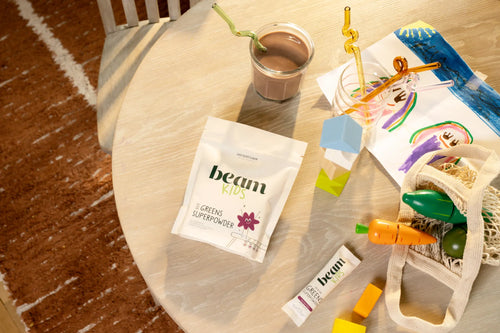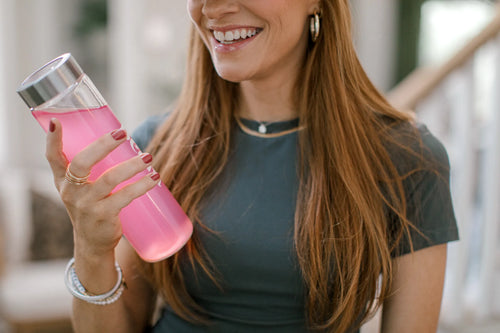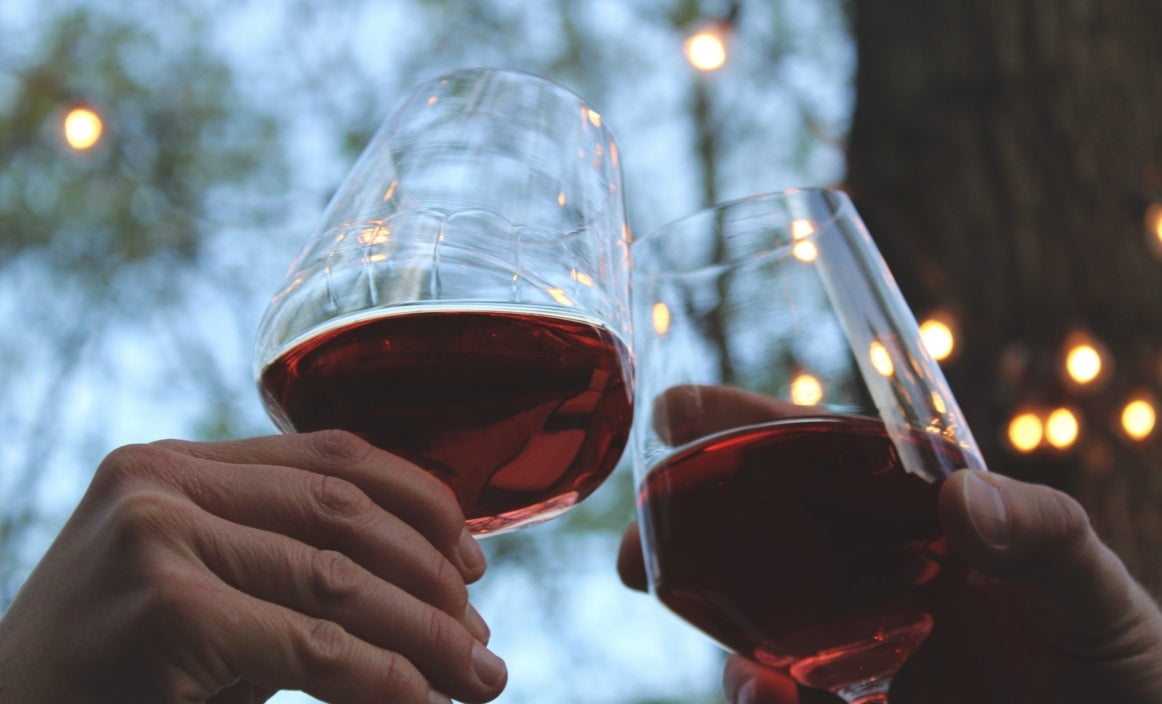The Truth About Alcohol and Sleep: Why It’s Not Helping You Rest
Ever felt extra drowsy after you drink alcohol, only to wake up at 3 a.m. feeling wide awake? It’s a common frustration.
While alcohol can make you fall asleep faster, it also disrupts the quality of your rest—especially by cutting into REM, the sleep stage that supports memory, mood, and overall recovery.
At Beam, we know how important a solid nighttime routine is, which is why mindful habits matter. While there’s nothing wrong with enjoying a drink now and then, regular alcohol use can throw off your body’s natural rhythms, leading to sluggish mornings, brain fog, and low energy.
By understanding this connection, you can make more informed choices about your wind-down routine—so you wake up feeling truly rested and ready to take on the day.
Understanding the Sleep Cycle
A good night’s sleep makes everything feel easier, but what’s actually happening while you rest?
Sleep isn’t just a passive state—it’s a series of stages that help your body recover, your brain recharge, and your memories solidify. Think of it as a pit stop for your entire system, ensuring you wake up refreshed and ready to go. But when something disrupts this cycle (like that extra glass of wine before bed), you’re more likely to wake up groggy and out of sync.
The Stages of Sleep
Sleep begins in a light phase (N1), where your body starts to relax, but you’re still semi-aware of your surroundings.
As you move into N2, your heart rate slows, and outside noise fades even more—this is when you might jolt awake at a sudden sound.
Then comes N3, the deep sleep stage, where true restoration happens. This is when your body repairs muscles, strengthens bones, and stores energy for the day ahead. Skipping this phase is like skipping maintenance on your car—eventually, you’ll feel the effects.
REM Sleep
After deep sleep, you enter REM (Rapid Eye Movement) sleep, where your brain kicks into high gear. This is when vivid dreams happen and when your mind processes emotions and experiences.
REM is your mental reset—it helps with creativity, problem-solving, and emotional balance. When you don’t get enough, you might feel foggy, irritable, or forgetful, like trying to use a phone with outdated software.
How Alcohol Impacts Sleep
A drink before bed might feel like the perfect way to unwind, but the way alcohol interacts with your sleep cycle tells a different story.
While it can bring on drowsiness quickly, it also disrupts the natural flow of sleep, leading to restless nights and sluggish mornings. It’s like hitting fast-forward at the start of a movie, only for the screen to glitch when the plot gets good. When you understand how alcohol affects sleep, you can make choices that leave you feeling genuinely well-rested.
Short-Term Effects
Even one drink can shake up your sleep cycle:
- Faster Sleep Onset: Alcohol may push your body into deep sleep more quickly, skipping the lighter sleep stages that typically ease you into rest.
- Fragmented Sleep: As your body metabolizes alcohol, sleep becomes more disrupted, leading to frequent awakenings.
- Increased Heart Rate: Alcohol can cause a spike in heart rate, making it harder to stay in a restful state.
- Dehydration & Restlessness: Since alcohol is a diuretic, you may wake up feeling parched and need more water throughout the night.
- More Bathroom Trips: Frequent trips to the restroom can further interrupt your sleep.
If you enjoy a drink in the evening, shifting the timing might help. Having it with dinner rather than right before bed can give your body more time to process it, reducing its impact on your sleep quality. Paying attention to how you feel the next morning can also offer insight into what works best for you.
Long-Term Consequences
When alcohol becomes a regular part of your bedtime routine, the effects of sleep deprivation can compound over time:
- Reduced REM Sleep: Over time, alcohol can suppress REM sleep, leading to poor memory, reduced focus, and emotional imbalance.
- Chronic Fatigue: Consistently missing out on quality sleep can result in low energy levels and sluggish mornings.
- Increased Snoring & Breathing Disruptions: Alcohol relaxes the muscles in the throat, which can lead to snoring and more serious breathing issues.
- Disrupted Circadian Rhythm: Regular alcohol consumption before bed can throw off your internal clock, making it harder to establish a steady sleep routine.
- Mood Swings & Mental Fog: Lack of restorative sleep can lead to irritability, difficulty concentrating, and increased stress levels.
The good news? Even small changes can help restore balance. Many people find that reducing or skipping alcohol in the evening leads to deeper sleep, better focus, and more energy for workouts, hobbies, and daily tasks. Experimenting with different nighttime habits can be a game-changer—because when sleep is solid, everything else tends to fall into place.
Alcohol and Sleep Disorders
If sleep already feels like a struggle, alcohol can make it worse—like trying to solve a puzzle in a noisy room. For those with conditions like insomnia or sleep apnea, drinking can disrupt the body’s natural rhythm, making symptoms more pronounced.
Insomnia
Insomnia makes it tough to fall asleep or stay asleep (or sometimes both), leaving you exhausted no matter how long you spend in bed.
While alcohol might make you drowsy at first, it’ll disrupt your sleep later, causing frequent wake-ups and reducing REM sleep—the most restorative stage. Over time, this cycle leads to chronic fatigue and poor focus.
Some people rely on a nightcap to unwind, but this often backfires, making sleep even more fragmented. Instead, swapping alcohol for a warm bedtime drink, light reading, or deep breathing exercises can promote better rest. If insomnia persists, consulting a healthcare provider can help break the cycle.
Sleep Apnea
Obstructive sleep apnea causes breathing interruptions throughout the night, lowering oxygen levels and leading to restless sleep. Alcohol makes it worse by relaxing throat muscles, increasing airway blockages, and intensifying snoring. This results in frequent awakenings, grogginess, and low energy the next day.
Cutting back on alcohol—especially before bed—can help reduce these disruptions. Combined with weight management, CPAP therapy, or other treatments, it’s a simple way to support better sleep and overall health. Even small adjustments can lead to big improvements in how you feel each morning.
Tips for a Better Night’s Sleep
Good sleep isn’t just about how many hours you get—it’s about quality. Small changes to your sleep routine can make a big difference, whether that means swapping out alcohol as a sleep aid for a warm cup of Beam Dream Powder or cutting back on late-night screen time. Think of it like setting the stage for a great performance: the right conditions help everything flow smoothly.
Avoiding Alcohol Right Before Bed
If you want to wake up feeling refreshed, try wrapping up your last drink about three hours before bed. This gives your body time to process the alcohol so it doesn’t interfere with your sleep cycles. It’s like waiting after a big meal before swimming—you need that buffer to avoid problems later.
If an evening drink is a part of your routine you love, consider having it with dinner instead of right before bed. Drinking water afterward helps with hydration and might reduce those middle-of-the-night wake-ups. Lighter, low-alcohol options can also ease the impact.
Want to see if timing makes a difference? Track how you feel for a week or two. If you wake up with more energy, that’s a clear sign you’re on the right track.
Healthy Alternative Nightcaps
Instead of reaching for a drink to help you wind down, try:
- A warm bath or light stretches to release tension
- Herbal teas like chamomile or a glass of warm milk
- Breathing exercises or meditation to quiet a busy mind
- Reading or journaling to transition from a long day
- Turning off screens 30 minutes before bed to reduce blue light exposure
- Beam Dream Capsules: these sleep-promoting capsules contain ingredients like reishi, magnesium, and melatonin, designed to help you relax and fall into deeper sleep
If stress is keeping you up, gentle yoga or relaxation apps can help. Creating a consistent, calming nighttime routine is one of the best ways to set yourself up for deep, restorative sleep. A few simple swaps today can lead to better energy, focus, and overall wellness tomorrow.
Rethinking Your Nightcaps: Small Changes for Better Sleep
How you wake up often depends on how you wind down. While alcohol might seem like a quick fix for sleep, it can quietly disrupt the deep, restorative rest your body needs. Since sleep affects everything from mood to memory, even small tweaks—like swapping a nightcap for calming tea or spacing your last drink a few hours before bed—can make a real difference.
If you’re waking up groggy or restless, it might be time to take a closer look at your evening routine. By easing away from alcohol right before bedtime, there’s a better chance of getting the balance back. And if a nightly drink starts to feel like the only way to wind down, it might be worth exploring other ways to relax. This could become a form of alcohol dependence that we all want to avoid. If ongoing sleep troubles cause concern, talking with a healthcare professional is a practical next step.
Life can be busy, and energy is precious. Sleep that’s steady and restorative helps keep each day on track. Whether you try new calming practices or simply shift the timing of your drink, every move toward better rest can support a happier, healthier you. For an easy way to unwind, try Beam’s sleep supplements—a soothing, non-alcoholic alternative designed to help you relax and recharge.
Frequently Asked Questions (FAQ):
How does alcohol affect sleep?
Alcohol might knock you out quickly, but it also interrupts vital sleep phases. REM sleep can get shaved off, leaving you less refreshed when morning comes.
What is the 20-minute rule for alcohol?
This idea involves waiting around 20 minutes after a drink to feel its full impact before deciding on another. It’s aimed at helping you notice how your body reacts so you don’t go overboard.
Why do you wake up at 3 a.m. after drinking?
As alcohol leaves your system, the sedative effect fades. Your brain may then become more alert, leading to mid-sleep wake-ups.
Can alcohol affect sleep days later?
Yes, frequent drinking can create a lingering impact on sleep patterns. Even once you stop, your body may need time to recalibrate for better rest.





